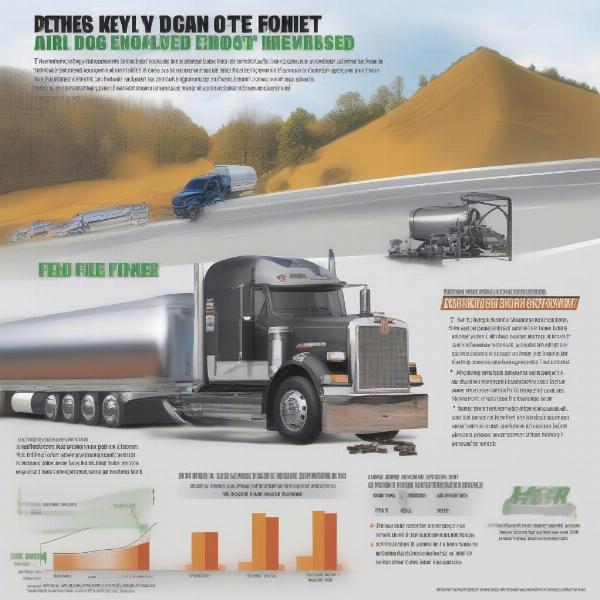Air dog fuel systems are becoming increasingly popular among diesel vehicle owners, particularly those seeking improved performance and reliability. These systems offer a significant upgrade over traditional fuel pumps by delivering clean, pressurized fuel to the engine, eliminating air and debris that can hinder combustion and cause damage. This results in increased horsepower, better fuel economy, and a smoother running engine. Whether you’re a seasoned mechanic or new to diesel engines, understanding the benefits of air dog fuel can help you make informed decisions about maintaining and enhancing your vehicle’s performance.
Understanding the Advantages of Air Dog Fuel Systems
Air dog fuel systems go beyond simply pumping fuel. They act as a complete fuel filtration and delivery system, ensuring that your engine receives the optimal fuel supply for peak performance. This is achieved through a multi-stage filtration process that removes virtually all contaminants, including water, dirt, and air. This clean fuel delivery protects sensitive engine components, reduces wear and tear, and promotes efficient combustion.
By removing air from the fuel lines, air dog systems prevent cavitation, a phenomenon that can cause damage to the fuel pump and injectors. Cavitation occurs when air bubbles collapse within the fuel, creating micro-jets of high-pressure fluid that erode metal surfaces over time. Air dog’s robust design and efficient air removal capabilities mitigate this risk, ensuring the longevity of your fuel system components.
Choosing the Right Air Dog Fuel System for Your Vehicle
Selecting the appropriate air dog fuel system depends on several factors, including the make and model of your vehicle, engine size, and performance goals. Different models offer varying flow rates and filtration capacities, so it’s essential to choose one that meets your specific needs. air dog fuel filter provides more information about different filter options.
Considering Flow Rate and Filtration
Flow rate refers to the volume of fuel the system can deliver per hour. A higher flow rate is generally better for modified engines with increased fuel demands. Filtration capacity refers to the size and type of filter used, which determines the system’s ability to remove contaminants. Consulting with a diesel performance specialist can help you determine the ideal flow rate and filtration capacity for your vehicle.
Maintaining Your Air Dog Fuel System
Like any other automotive component, regular maintenance is crucial for ensuring the long-term performance of your air dog fuel system. This includes routine filter changes, checking for leaks, and inspecting the system for any signs of wear and tear. Proper maintenance not only extends the life of the system but also helps maintain optimal fuel efficiency and engine performance. For comparison with other systems, check out air dog vs fass.
Filter Replacement and System Inspection
Following the manufacturer’s recommended maintenance schedule is essential. This typically involves replacing the fuel filter at specific intervals based on mileage or operating hours. Regular inspections of the fuel lines, fittings, and pump should also be performed to identify potential leaks or damage early on.
Air Dog Fuel: A Wise Investment for Diesel Owners
Investing in an air dog fuel system offers numerous benefits for diesel vehicle owners. From improved fuel economy and enhanced performance to increased engine reliability and longevity, these systems provide a valuable upgrade for any diesel engine. By ensuring a clean, consistent fuel supply, air dog systems contribute to a smoother, more powerful, and more efficient driving experience. If you’re considering switching dog foods, you might find this article on gsp dog food or more specifically, dog food for german shorthaired pointer helpful.
 Air Dog Fuel System Benefits
Air Dog Fuel System Benefits
Conclusion
Air dog fuel systems offer a comprehensive solution for optimizing diesel engine performance and reliability. By delivering clean, pressurized fuel, these systems contribute to increased horsepower, better fuel economy, and reduced engine wear. Choosing the right system and maintaining it properly ensures long-term benefits and a smoother, more powerful driving experience.
FAQ
- How often should I change the filter on my Air Dog fuel system? Follow the manufacturer’s recommendations, which typically range from every 15,000 to 25,000 miles.
- What are the signs of a failing Air Dog fuel pump? Common signs include a drop in fuel pressure, rough idling, and decreased engine performance.
- Can I install an Air Dog fuel system myself? While possible, professional installation is recommended to ensure proper fitment and functionality.
- Will an Air Dog fuel system void my vehicle’s warranty? In most cases, no, but it’s best to check with your dealer or warranty provider.
- Are Air Dog fuel systems compatible with all diesel engines? Air Dog offers a range of systems designed for various makes and models of diesel vehicles. Consult their website or a diesel specialist to determine compatibility.
- How does an Air Dog system improve fuel economy? By delivering cleaner fuel and ensuring optimal combustion, it can lead to improved fuel efficiency.
- Is an Air Dog system worth the investment? For diesel owners seeking enhanced performance and reliability, it can be a worthwhile investment.
Related Articles
Consider reading walks on dartmoor with dogs for enjoyable outdoor activities with your canine companion.
About ILM Dog
ILM Dog is your trusted international resource for expert advice on dog care and breeding. We offer practical and reliable information on a wide range of topics, including breed selection, health and medical care, training, nutrition, grooming, exercise, puppy care, senior dog care, traveling with dogs, and product recommendations. Whether you are a seasoned dog owner or just starting your journey, ILM Dog has the resources you need. Contact us today to learn more! Email: [email protected], Phone: +44 20-3965-8624.